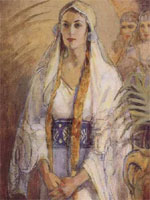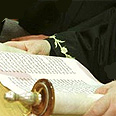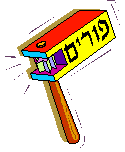WAYS OF LIFE
Purim is not part of the seven feasts reqired by God in Leviticus 23, still it is biblical. It refers to the Book of Esther and remindes of the salvation of the Jewish people in Persian exile (598-539 BC) of the impending annihilation. It takes place on the 14th and 15th of the Jewish month Adar (February/March in the Gregorian calender). If it is a leap year, then an additonal month - Adar II - is being added and the feast takes place in it. The day before the feast, e.g. on Adar 13, many Jews observe a fast day, in order to remember queen Esther's big fast.I'll share here the most important events of the book of Esther, since they look similar to present day events...
themselves on the ground when he passed by. Yet Mordechai refused doing so and was being finked on straight away by the other officials of the court. Upon learing that Mordechai was a Jew, Haman in his wrath, didn't just want to take revenge on Mordechai alone, but on the entire Jewish people. The Persian empire was huge back then, consisting of 127 provinces. It stretched from as far as India to its east and Ethiopia to its south. Here, Haman saw his chance of exterminating the complete Jewish poeple...
Esther is the Persian name of Jewish Hadassa. She was the beautiful foster child of her uncle Mordechai, who had brought her up since she was an orphan girl. Years later, king Ahasverus (seemingly Xerxes) married her. Upon the advice of her uncle, she did not disclose her ethnicity yet. Eventually, Haman, the Amalekite became the highest ranking official at king Ahasverus' court. The warlike Amalekites were the descendents of Esau, brother of Jacob, who often fought against Israel. Haman was a grim enemy of the Jews. And he was sleeky, wicked and self-seeking. Everyone had to throw
Don't we know a similar event from our own past? A man named Hitler also wanted to exterminate the Jewish people... Yet whoever tries to touch the Jews is touching the apple of God's eye (Zachariah 2:8)! Such a thing never works out well! And even nowadays, certain people are trying to wipe Israel and the Jews off the map... and again they are descendents of the Amalekites ... one of them even being a Persian again!!!
Haman had cast a so-called Pur, a lot (Purim is the plural form), in order to select the best point in time to kill all Jews. It fell on Adar 13. Cunningly, he convinced the king to approve of his plan and to give him free rein in the accomplishment. So Haman issued a decree, sending it by letter to all rulers and governors of the 127 provinces of the kingdom, ordering them to annihilate the Jews at the same time on Adar 13.
Everywhere the Jews heard of this decree and got in a swivet. Mordechai hurried to the palace, asking his nice, the queen, for help: "And who knows but that you have come to royal position for such a time as this?" (Esther 4:14).
As court etiquettes in those times did not allow even for a wife to approach the king without having an appointment, Esther decided to fast for three days. All Jews in Shushan (Susa), the capital of the Persian empire back then, were to fast with her in order to enforce her prayers. Her decision to help her people was so great that she said, "I and my maids will fast as you do. When this is done, I will go to the king, even though it is against the law. And if I perish, I perish" (Esther 4:16).
Her words "And if I perish, I perish" and her determination caused her to be famous among her people and her memory is being honored up to this day!
After that fast, her husband, the king, accepted her to come in. In a diplomatic way, she first prepared a relaxed atmosphere and invited the king together with Haman to a festive dinner, where she wanted to let him know about her request. Yet she didn't say anything then, instead invited to a second dinner. Only then she began to speak: "If I have found favour with you, O king, and if it pleases your majesty, grant me my life - this is my petition. And spare my people - this is my request. For I and my people have been sold for destruction and slaughter and annihilation. If we had merely been sold as male and female slaves, I would have kept quiet, because no such distress would justify disturbing the king" (Esther 7:3-4).
The king was appalled and wanted to know who was responsible for it. She pointed toward Haman, who then was hanged on the same gallows that he had put in order to hang Mordechai... The Jews were allowed - again per decree - to fight against their enemies and were saved like this!
In the penultimate chapter of the Book of Esther we read how Mordechai, who in the meantime had been promoted as second most important official in the empire, implemented the feast of Purim:
"Mordecai recorded these events, and he sent letters to all the Jews throughout the provinces of King Xerxes, near and far, to have them celebrate annually the fourteenth and fifteenth days of the month of Adar as the time when the Jews got relief from their enemies, and as the month when their sorrow was turned into joy and their mourning into a day of celebration. He wrote to them to observe the days as days of feasting and joy and giving presents of food to one another and gifts to the poor. So the Jews agreed to continue the celebration they had begun, doing what Mordecai had written to them" (Esther 9:20-23).
crowd; while the name of Mordechai is being cheered!
Magillah readingWhen Purim begins in the evening after the fast (as to the Jewish calender, the days begin after sundown), on Adar 14, people celebrate joyfully! All of the Book of Esther is being read (Megillah) and accompanied with lots of noise: each time, the name of Haman is being read, children (and also adults!) make a loud noise with special rattles, the so-called graggers and boos from the uniquely! Costumes and masks shall depict the invisibility of God - not to be seen yet present!
There is a big, festive meal and people give presents to loved ones, friends and the poor. It is a joyful celebration - yet no joy because of the death of Haman or any other anti-semitic person, but a joy because of the salvation of the Jewish people.
Another custum at Purim are the street parades and events where poeple dress up and often wear masks. This is to show the pecularity of the Book of Esther, in which God is not mentioned at all, although He is very present. The many "coincidences" that can be found everywhere in the story, express His work For believers in Yeshua (Jesus), Purim is a good opportunity to have a time of fast and prayer for the Jewish people and the situation in Israel - especially in our present times, where once again it has become very difficult for Israel and the Jews. Again, the spirit of Haman has risen; this time, like in queen Esther's time very clearly yet again in Persia, which is nowaday's Iran, and also from an Amalekite's descendant... And the world turns once again against God's people in a dangerous way.
God's people - as believers in Yeshua we now belong to them too, since we are grafted in, as it is mentioned in Romans 11:17-18! So this people, in a way is also our people, right? Read Galatians 3:29, "And if ye be Christ's, then are ye Abraham's seed, and heirs according to the promise." In the buttom line, prayers for Israel and God's people are prayers for ourselves!





